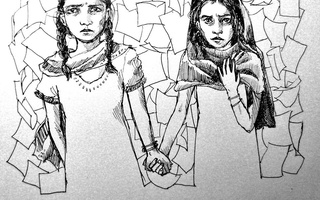A Sociology course about modern-day slavery designed by undergraduates will be taught next spring by Sociology Professor Orlando Patterson.
The course, which is the culmination of months of research by members of Harvard College for Free the Slaves (HCFTS) and fellows at the Harvard Kennedy School’s Carr Center for Human Rights Policy, is tentatively titled “Slavery and Trafficking in the Modern World.” It is currently under consideration for inclusion in the General Education curriculum.
Though Patterson presented the course to the Gen Ed committee this spring, he said that committee members expressed concerns that it may not have a long enough shelf life and that it would be too centered on activism.
“There’s no danger of that with me,” said Patterson, who will present the course to the Gen Ed committee again in the fall. “The beginning of activism is understanding and knowledge, so we’re going to let the facts speak for themselves.”
The curriculum analyzes slavery through five lenses: health, law, history, economics, and social movements.
“A lot of times modern slavery gets tagged as a human rights issue, but we’re trying to show that a lot of other disciplines contribute to an understanding of it as well,” said HCFTS President Kelli K. Okuji ’10.
The six student researchers spent months reading the literature of their field, reviewing curricula at other colleges, and interviewing professors and modern abolitionists.
“I love teaching in general, so it was fun thinking, ‘If I were a teacher, how would I express this new subject?’” Catherine D. Cook ’12 said. “But we also had a lot of responsibility to be very serious and truthful about the matter.”
The students’ work was revised by a team of fellows and professors, including History and Literature Lecturer Timothy P. McCarthy ’93. But designing the syllabus and creating assignments were only the first steps, according to Amanda N. Nguyen ’13.
“We had to go and make appointments and present the course to professor after professor, and we petitioned to show that the community supported this issue,” Nguyen said. “It was important that we had certain people on board.”
The students had to “plow on” in the face of the course’s uncertain approval, according to research adviser Eric Goodwin, a master’s student at the Extension School. The course was approved by the Sociology department last month.
“When we met with her, President Faust said in her time here, there have been no student-led initiatives like this where students have approached the university with course in hand, demanding that it be taught,” Okuji said of her meeting with Faust at office hours in February.
Goodwin said the course reveals ways that humans contribute to structures that facilitate different kinds of trafficking, from debt bondage to sex slavery.
“This is the great human rights challenge of our generation, and in order for us to face that challenge and actually finally eradicate slavery—which I think is something we can do in a generation—it takes leaders,” said E. Benjamin Skinner, a Carr Center fellow and another research adviser. “And what better place to train leaders than Harvard University?”
—Staff writer Julie R. Barzilay can be reached at jbarzilay13@college.harvard.edu.
Read more in News
FAS Deficit On the Road Toward RecoveryRecommended Articles
-
Carr Center Douglass Prize Awarded to KaraSiddharth A. Kara, a Fellow with the Carr Center Program on Human Trafficking and Modern-Day Slavery, won the 2010 Frederick Douglass Book Prize for his book, “Sex Trafficking: Inside the Business of Modern Slavery.”
-
Profs Talk Econ of SlaveryProfessors and students discussed the deep connection between America’s history of human bondage and its economic ascendancy during a three-day conference at Harvard and Brown University entitled “Slavery’s Capitalism: A New History of American Economic Development.”
-
Students Publish Booklet on Slavery at HarvardIn the early days of Harvard, slaves played a role in the everyday life of the university. They worked in the homes of faculty and alumni, and later, they hid in the Warren House as part of the Underground Railroad.
-
 Addison’s ‘Walk’ a Trite but Effective Exploration of Exploitation
Addison’s ‘Walk’ a Trite but Effective Exploration of Exploitation -
Harvard's Exploitation of LaborDespite its massive wealth, Harvard has continued to exploit its workers throughout its history.
-
 Harvard and Slavery: Office Hours with Sven Beckert
Harvard and Slavery: Office Hours with Sven Beckert













